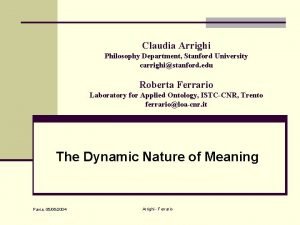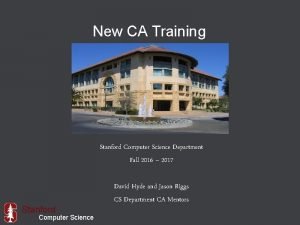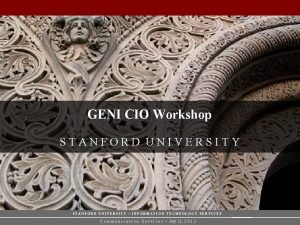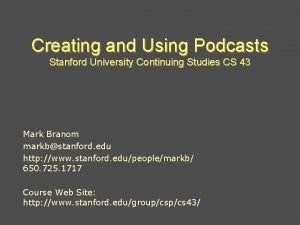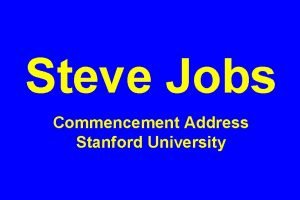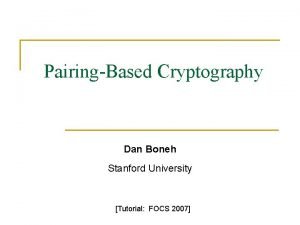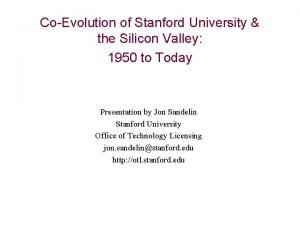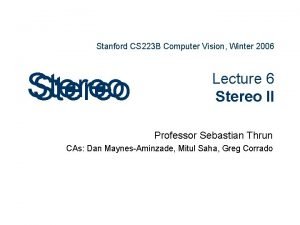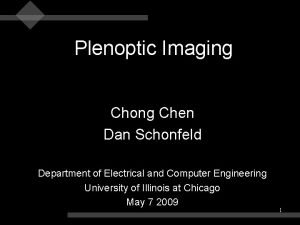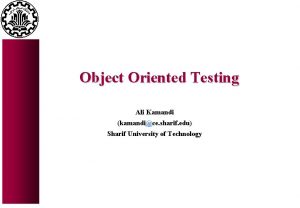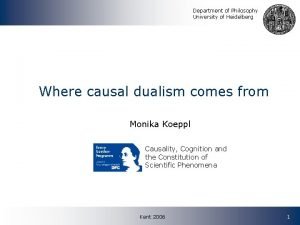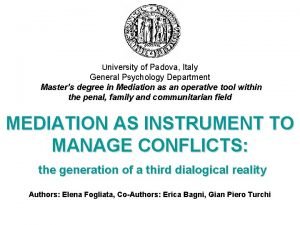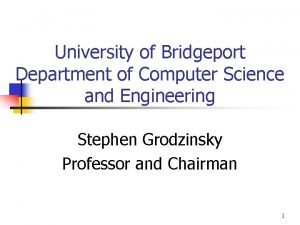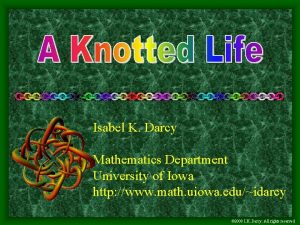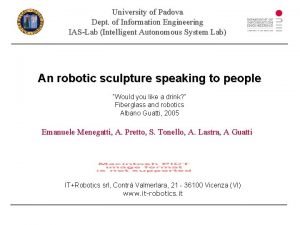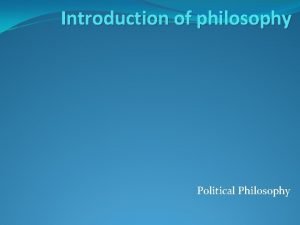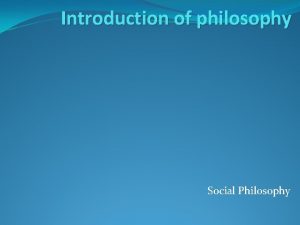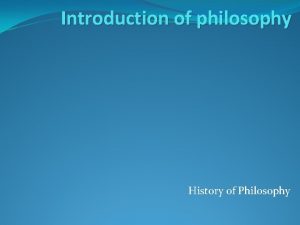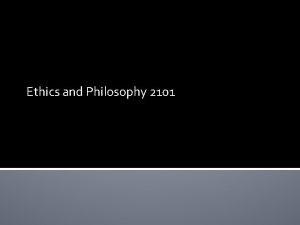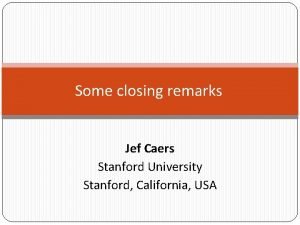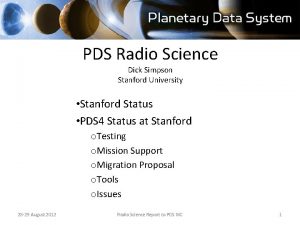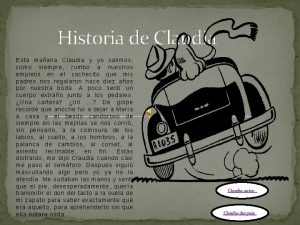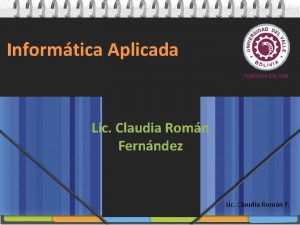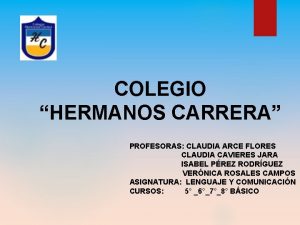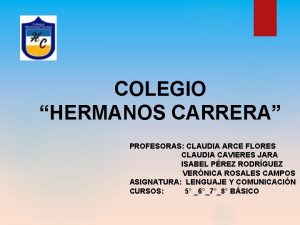Claudia Arrighi Philosophy Department Stanford University carrighistanford edu




















![“We almost always fail […]. Yet we almost always nearly succeed: This is the “We almost always fail […]. Yet we almost always nearly succeed: This is the](https://slidetodoc.com/presentation_image_h/73abf33dbaf527cffd12bea5211f8b80/image-21.jpg)
- Slides: 21

Claudia Arrighi Philosophy Department, Stanford University carrighi@stanford. edu Roberta Ferrario Laboratory for Applied Ontology, ISTC-CNR, Trento ferrario@loa-cnr. it The Dynamic Nature of Meaning Pavia, 05/06/2004 Arrighi - Ferrario

Outline of the talk n Theories of meaning in the tradition in philosophy n Problems and solutions in computer science n Our proposal based on meaning negotiation, a ground where the two disciplines meet Pavia, 05/06/2004 Arrighi - Ferrario 2

What Is Meaning? Meaning connects words and objects in the world; it is dynamic, fluid, it changes through time and it is subject to social and cultural influences Pavia, 05/06/2004 Arrighi - Ferrario 3

The Tradition in Philosophy Though this dynamicity may seem obvious, strangely enough it has been mostly neglected in the traditional literature in philosophy (i. e. in the direct reference and in the descriptionist approach) Pavia, 05/06/2004 Arrighi - Ferrario 4

Example: The Descriptionist Approach Pavia, 05/06/2004 Arrighi - Ferrario 5

Example: The Direct Reference Approach Pavia, 05/06/2004 Arrighi - Ferrario 6

A Third Approach There is a third approach that seems to capture such a dynamicity, the idea of meaning as use suggested by Ludwig Wittgenstein in the Philosophical Investigations, and elaborated more recently by philosophers such as Michael Dummett and Robert Brandom Pavia, 05/06/2004 Arrighi - Ferrario 7

A Third Approach (cont’d) According to this view, meaning is a tool to be used in practices to find reference of words. These practices have a dynamic structure like a game, and the meaning of a word is the tool that enables the speaker to play the game it is not a solution in itself Pavia, 05/06/2004 Arrighi - Ferrario 8

Weaknesses of the Third Approach The basic idea of meaning as a tool is very interesting, but there is not a clear characterization of the kind of process in which this tool has to be used Pavia, 05/06/2004 Arrighi - Ferrario 9

The Computer Science Dilemma In computer science, scholars are often faced with problems arising by the fact that the meaning ascribed to words varies according to the different conceptual schemes adopted by different “speakers” (i. e. databases using different schema, document repositories using different classification structures, users’ file systems etc. ) Pavia, 05/06/2004 Arrighi - Ferrario 10

Solutions Proposed in Computer Science Two main approaches have been developed in computer science to overcome these problems: n A centralized approach, based on the creation of global schemas or shared models n A peer-to-peer approach, where schemas/models are directly mapped onto each other Pavia, 05/06/2004 Arrighi - Ferrario 11

The peer-to-peer solution This solution is composed by two different processes: • a process of meaning coordination, through which the involved parties try to establish mappings between the meaning of a collection of expressions. […] • a process of meaning negotiation, namely the process of solving semantic conflicts among parties when a direct mapping is not possible […]. Pavia, 05/06/2004 Arrighi - Ferrario 12

From Computer Science to Human Speakers? Do these processes have a role in everyday language? Generalized approach: there is the attempt to make language uniform by teaching rules at school and providing dictionaries - but natural language is much more flexible than that, fixed rules and definitions are not enough to explain how good we are in resolving the large amount of ambiguities in language Pavia, 05/06/2004 Arrighi - Ferrario 13

From Computer Science to Human Speakers? (cont’d) And what about the peer-to-peer approach and meaning negotiation? The idea of negotiation seems to capture exactly what is going on between speakers who start a conversation with different concepts about the meaning of some words (cf. the large amount of work on this topic by the psychologist Herbert Clark) Pavia, 05/06/2004 Arrighi - Ferrario 14

A Basic Example of Meaning Negotiation Viola Massimo (She sees a phonebook half-destroyed on the floor) "My God, who has made this mess? " Socrates = male name philosopher, ancient Greece, . . . does not fit “What do you mean, Socrates? ” Leaving bones in living room? Must be a dog… What can be kept of Socrates? That is a male name. . “Socrates is your dog, isn’t he? ” Socrates = male name puppy, Massimo’s, messy, . . . " Must have been Socrates " “Yes… he has even left a bone in here". “Yes, he is just a puppy” Temporary result of negotiation for Viola’s meaning of Socrates Pavia, 05/06/2004 Arrighi - Ferrario 15

Our Proposal We want to give a theoretical account of meaning that includes also dynamic aspects. According to this account, meaning is neither the referent, nor a definite description; it is a tool to identify reference, or to gather information about it. The process in which we use this tool is a process of negotiation. Pavia, 05/06/2004 Arrighi - Ferrario 16

Private meaning This tool is acquired by each individual when she learns a word for the first time. It can be thought as a modifiable semantic net. This acquired meaning is the so-called private (or speaker’s) meaning. After the acquisition it is shaped and transformed at every interaction/negotiation. Pavia, 05/06/2004 Arrighi - Ferrario 17

Public Meaning The public (or literal) meaning is something that doesn’t exist by itself, it is merely a generalization/abstraction emerging from the multiple private meanings. As such, it is modified much slower, and this gives the characteristic impression of stability. Pavia, 05/06/2004 Arrighi - Ferrario 18

Process of Negotiation The basic steps of negotiation are few: n Proposal n Acceptance (then no negotiation needed) n n or Rejection (implicit or explicit) Repair suggested by one of the speakers Acceptance or Rejection. . . End negotiation - the speakers’ meaning of the word maybe has been modified during the process, at least temporarely Pavia, 05/06/2004 Arrighi - Ferrario 19

Conclusion To sum up, our proposal consists of a treatment of meaning as emerging from processes of communication and negotiation taking place among agents: these processes can reshape the representation of private meaning, and in the long run the abstract representation of the public meaning. Pavia, 05/06/2004 Arrighi - Ferrario 20
![We almost always fail Yet we almost always nearly succeed This is the “We almost always fail […]. Yet we almost always nearly succeed: This is the](https://slidetodoc.com/presentation_image_h/73abf33dbaf527cffd12bea5211f8b80/image-21.jpg)
“We almost always fail […]. Yet we almost always nearly succeed: This is the paradox of communication. ” [W. Rapaport, What Did You Mean by That? Misunderstanding, Negotiation, and Syntactic Semantics, p. 402] Pavia, 05/06/2004 Arrighi - Ferrario 21
 Claudia arrighi
Claudia arrighi Meredith hutchin
Meredith hutchin Highwire stanford edu
Highwire stanford edu Stanford security awareness
Stanford security awareness Stanford university continuing education
Stanford university continuing education Stanford university
Stanford university Steve jobs commencement address
Steve jobs commencement address Stanford cryptography
Stanford cryptography Dr ashe stanford university
Dr ashe stanford university Silicon valley stanford university
Silicon valley stanford university Cs223 stanford
Cs223 stanford Stanford university
Stanford university Edu.sharif.edu
Edu.sharif.edu Heidelberg university philosophy
Heidelberg university philosophy Department of law university of jammu
Department of law university of jammu Department of geology university of dhaka
Department of geology university of dhaka Mechanicistic
Mechanicistic University of bridgeport it department
University of bridgeport it department University of iowa math department
University of iowa math department Sputonik v
Sputonik v Texas state university psychology department
Texas state university psychology department Department of information engineering university of padova
Department of information engineering university of padova
